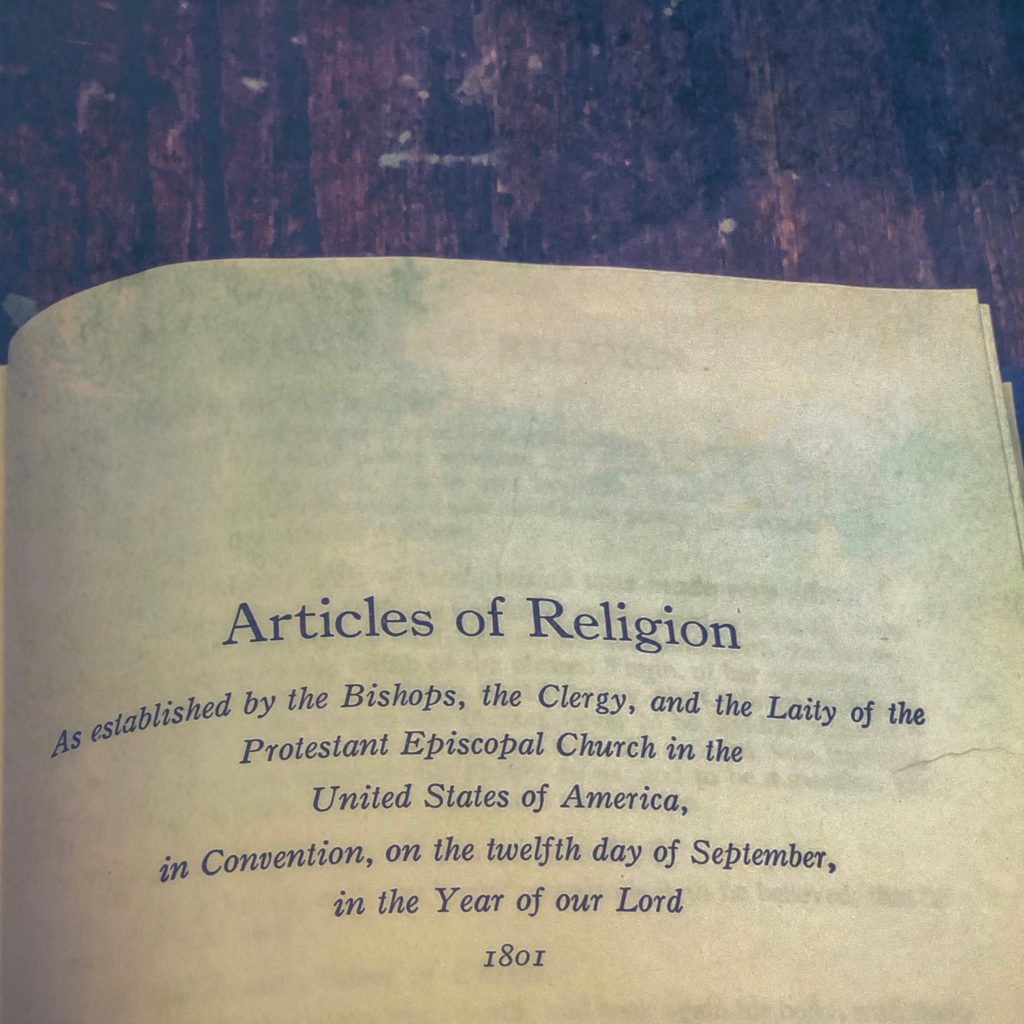
As Christ died for us, and was buried, so also is it to be believed that He went down into Hell.
by the Rev. Canon Scott Gunn
This one will be tough for lots of people. Plenty of Christians don’t even believe in hell these days, and they certainly don’t give much thought to Christ’s descent into Satan’s hood. It’s a pretty ancient idea though, with solid scriptural warrant.
The first letter of Peter says,
For Christ also died for sins once for all, the righteous for the unrighteous, that he might bring us to God, being put to death in the flesh but made alive in the spirit; in which he went and preached to the spirits in prison, who formerly did not obey, when God’s patience waited in the days of Noah, during the building of the ark, in which a few, that is, eight persons, were saved through water (1 Pt 3:18-20).
And also, in the fourth chapter, “For this is why the gospel was preached even to the dead, that though judged in the flesh like men, they might live in the spirit like God” (1 Pt 4:6).
You can see that Jesus Christ, while he was dead, proclaimed the Gospel to the dead and rescued them from Satan’s grasp.
People who say the Daily Office will know the teaching that Jesus Christ descended into hell from the Apostles’ Creed. This Article comes almost straight from the Elizabethan version (Rite I in the US prayer book) of the Apostles’ Creed, “He descended into hell”. Modern versions of the creed soften it a bit: “He descended to the dead.” Most worshipers these days, who come only to Sunday celebrations of the Eucharist, will have no clue about this doctrine, since it gets no mention in the Nicene Creed.
It does pop up, at least in parishes I serve, in a big way once a year. It is my practice to read (or to have the deacon read) St. John Chrysostom’s brilliant Easter sermon at the Great Vigil of Easter. It makes Easter all about Christ’s complete and utter victory over Satan in the harrowing of hell.
The Lord has destroyed death by enduring it.
The Lord vanquished hell when he descended into it.
The Lord put hell in turmoil even as it tasted of his flesh.
Isaiah foretold this when he said,
“You, O Hell, were placed in turmoil when he encountered you below.”
Hell was in turmoil having been eclipsed.
Hell was in turmoil having been mocked.
Hell was in turmoil having been destroyed.
Hell was in turmoil having been abolished.
Hell was in turmoil having been made captive.
Hell grasped a corpse, and met God.
Hell seized earth, and encountered heaven.
Hell took what it saw, and was overcome by what it could not see.
Wow. I don’t know about you, but I find it profoundly empowering to contemplate a God who would enter the depths of hell to liberate captives. A God who would defy Satan in hell will also enter into the depths of our humanity to free us from sin.
Unfortunately, lots of people deny the existence of hell, even though Jesus teaches about it and there’s clear biblical witness and church tradition to support its existence.
In the twenty-fifth chapter of Matthew, Jesus teaches the parable of the sheep and goats. As you’ll recall, those who cared for the least “inherit the kingdom prepared for you from the foundation of the world” (Mt 25:34), while those who do not care for the least are told, “Depart from me, you cursed, into the eternal fire prepared for the devil and his angels” (Mt 25:41).
Matthew has many references to hell, for example this cheery gem from the tenth chapter, “And do not fear those who kill the body but cannot kill the soul; rather fear him who can destroy both soul and body in hell” (Mt 10:28).
Don’t get me wrong. I’m not thrilled about hell, nor do I think it’s helpful to use hell as a blunt object to coax people into doing the right thing here on earth. I hope that God is generous at judgment day, since I cannot imagine what sins would merit eternal condemnation. But in the end, it seems to me that hell is a part of the package of God’s economy of salvation.
Of course, there’s a long history of avoidance of this doctrine. Some of the framers of the first American prayer book wanted to take “He descended into hell” out of the Apostles’ Creed, and they ended up making that clause optional. It didn’t fit with Enlightenment sensibilities. (Insert joke here about a long history of rampant heresy in the Episcopal Church.)
So, for what it’s worth, here’s my take on all this. It’s difficult to square the idea of hell with the idea of a loving God. Who would be in that hell? Fortunately, this decision is about our pay grade. And, in fact, I think it’s liberating to worship a God who enters the depths of hell to proclaim perfect love and freedom. A God who enters hell can also be present in Darfur. A God who defeats hell can defeat anything.
And this gets us to the main point of this article. Belief in hell is a necessary premise, but the teaching here is about the harrowing of hell. The sermon excerpt above from John Chrysostom poetically describes the power of this belief: Jesus Christ has vanquished all evil, including the bastion of Satan’s power. Jesus Christ has liberated captives in hell, which assures us that Jesus Christ can liberate us from our captivity to sin.
There is a well-known homily for Holy Saturday traditionally ascribed to Bishop Melito of Sardis (d. 180), in which he describes the moment Christ arrives into hell:
[Christ] has gone to search for our first parent, as for a lost sheep. Greatly desiring to visit those who live in darkness and in the shadow of death, he has gone to free from sorrow the captives Adam and Eve, he who is both God and the son of Eve. The Lord approached them bearing the cross, the weapon that had won him the victory. At the sight of him Adam, the first man he had created, struck his breast in terror and cried out to everyone: “My Lord be with you all.” Christ answered him: “And with your spirit.” He took him by the hand and raised him up, saying: “Awake, O sleeper, and rise from the dead, and Christ will give you light.”
Indeed, when we confess that Christ has descended into hell, we also confess that he comes to us and calls us to new life and light.
Here are some questions on which we might meditate.
- In your experience, does the church talk about hell too much or too little?
- What does it mean for us — in our earthly pilgrimage — to contemplate Jesus Christ preaching to those held captive in hell?
- Might God’s mission to liberate humanity compel us, as the Body of Christ, to enter the places of “hell on earth” to preach and to practice liberation?
Let us pray.
We thank you, heavenly Father, that you have delivered us from the dominion of sin and death and brought us into the kingdom of your Son; and we pray that, as by his death he has recalled us to life, so by his love he may raise us to eternal joys; who lives and reigns with you, in the unity of the Holy Spirit, one God, now and forever. Amen. (BCP, p. 224)
Scott Gunn is executive director of Forward Movement, a ministry of the Episcopal Church that inspires disciples and empowers evangelists. Before serving at Forward Movement in Cincinnati, he was a parish priest in the diocese of Rhode Island. You can find him online on Twitter (@scottagunn) or his blog, www.sevenwholedays.org. A shorter version of this essay originally appeared on the author’s blog as part of a 2011 Lenten series on the 39 Articles.

Is it not also possible to acknowledge the existence of hell, but question its nature as a place/state of eternal torment? There is one theological view (believed by Church Fathers such as St. Gregory of Nyssa and St. Isaac of Nineveh) which suggests that hell is purgative in nature rather than retributive, and that the damned remain in hell only as long as it takes to cleanse them of their sins and encourage their repentance, after which they are admitted into heaven with the saints. I think that view of hell (purgatorial universalism) is much more in line with the loving God revealed in Jesus Christ than the view of hell as an eternal torture chamber. I also think it better emphasizes Christ’s total victory over hell.